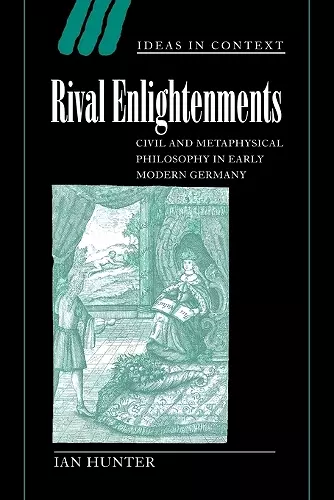Rival Enlightenments
Civil and Metaphysical Philosophy in Early Modern Germany
Format:Paperback
Publisher:Cambridge University Press
Published:2nd Nov '06
Currently unavailable, and unfortunately no date known when it will be back
This paperback is available in another edition too:
- Hardback£105.00(9780521792653)

A 2001 reinterpretation of early modern German intellectual history, treating the civil and metaphysical philosophers as rival intellectual cultures.
Rival Enlightenments, first published in 2001, is a major reinterpretation of early modern German intellectual history. Ian Hunter treats the civil philosophy of Pufendorf and Thomasius and the metaphysical philosophy of Leibniz and Kant as rival intellectual cultures or paideiai. Combining careful scholarship with vivid polemic, Hunter presents insights for philosophers and historians alike.Rival Enlightenments, first published in 2001, is a major reinterpretation of early modern German intellectual history. Ian Hunter approaches philosophical doctrines as ways of fashioning personae for envisaged historical circumstances, here of confessional conflict and political desacralization. He treats the civil philosophy of Pufendorf and Thomasius and the metaphysical philosophy of Leibniz and Kant as rival intellectual cultures or paideiai, thereby challenging all histories premised on Kant's supposed reconciliation and transcendence of the field. This study reveals the extraordinary historical self-consciousness of the civil philosophers, who repudiated university metaphysics as inimical to the intellectual formation of those administering desacralized territorial states. The book argues that the marginalization of civil philosophy in post-Kantian philosophical history may itself be seen as a continuation of the struggle between the rival enlightenments. Combining careful and well-documented scholarship with vivid polemic, Hunter presents penetrating insights for philosophers and historians alike.
'This fresh assessment helps us see that Kant re-spiritualized morality and citizenship, as well as the state, although in an abstract and appealing 'modern way'.' Thomas Robisheaux, Duke University
'… we should thank Hunter for a provocative and valuable book …' Theory and Event online version
'… by the end of the book you'll never again be able to look your students in the eye and utter the word 'the enlightenment' in the singular. You will likely think long and hard about leaving Pufendorf, and perhaps even Thomasius, off any political philosophy reading list that includes Rousseau and Kant. You will leave convinced that political and moral concerns played central roles in shaping early modern philosophy.' Theory and Event
'By this complex and fascinating structure of philosophical and historical argument. Hunter hopes to free his readers from captivity to the dominant Kantian picture of Enlightenment and modernity … This ambitious historical project is pursued through the interpretation of a wide range of major and minor primary texts over two centuries … This is an invaluable study for anyone interested in the Enlightenment and its continuing influence. In virtue of its scholarship and refreshingly provocative theses it should be at the centre of any debate over 'What is Enlightenment?'.' Economy and Society
'… a work of outstanding scholarship and originality …' Economy and Society
'… a book Kant scholars should definitively take notice of. Based on intensive historical analysis, Hunter rejects the common notion that the German enlightenment found its high point in Kant. He does so in favour of a reconsideration of authors such as Pufendorf and Thomasius.' Kantian Review
ISBN: 9780521025492
Dimensions: 228mm x 152mm x 27mm
Weight: 648g
428 pages